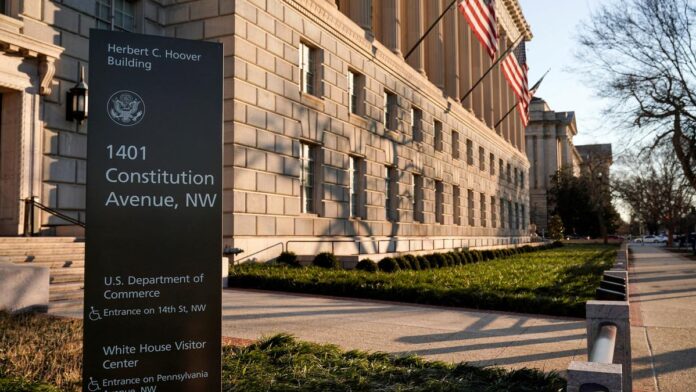
The Department of Commerce building in Washington D.C. File
| Photo Credit: Reuters
The story so far: The government is still gauging the impact of a decision by the U.S. Treasury department to impose sanctions on 19 Indian entities among nearly 400 companies, mainly for supplying “dual-use” technologies to Russia. In addition, the Bureau of Industry and Security run by the U.S. Commerce Department added 40 companies including five from India for re-exporting goods and parts to Russia that were imported from the U.S.
Why are recent U.S. sanctions significant?
Since April 2021, when U.S. President Joe Biden passed an executive order (E.O. 14024) on “Blocking Property With Respect To Specified Harmful Foreign Activities of the Government of the Russian Federation”, the U.S. has sanctioned hundreds of companies from more than 20 countries worldwide for supplies and sales to Russia, including some from India. But on October 30, the U.S. Department of Treasury invoked the E.O. to sanction 19 Indian entities, including companies and individuals for providing “dual-use” technologies to Russia and other deals with Russian companies calling them “Third-Country Sanctions Evaders”. The companies, mostly based in Delhi, Uttar Pradesh, Bengaluru and Hyderabad, are reputable, well-established companies dealing in technological manufacturing, with some even holding government contracts. These companies will now be on a U.S. “blacklist”, have assets or funds in the U.S. frozen, and face travel bans.

How has the Indian government responded?
The Ministry of External Affairs (MEA) has been fairly muted on the action by the U.S., which is likely to cost Indian companies millions of dollars in contracts and legal appeals. When asked during a briefing, Ministry of External Affairs spokesperson Randhir Jaiswal said that the MEA had “seen reports of U.S. sanctions”, but declined to comment on whether this was discussed between U.S. National Security Adviser Jake Sullivan and NSA Ajit Doval, who spoke a day later. The MEA said the companies were “not in violation of Indian laws”, and pointed out that the government was trying to “clarify issues”. “India has a robust legal and regulatory framework on strategic trade and non-proliferation controls,” Mr. Jaiswal said, referring to India’s membership of key non-proliferation export control regimes such as the Wassenaar Arrangement, Australia Group and the Missile Technology Control Regime.
What else can India do?
India does not recognise unilateral sanctions by the U.S. or any other country, following only those sanctions imposed by the UN. However, as India-U.S. high-tech trade increases, the U.S.’s strictures will have an increasing impact on both Indian companies and the government’s moves. According to the MEA, Indian agencies are already “sensitising” Indian companies on the new measures being implemented by the U.S. that could impact them. The government could also increase measures to sanction-proof those Indian companies doing business with Russia, by building more structural banking mechanisms, and facilitating payments in national currencies, as have been explored for refineries procuring Russian oil, diamond processing units and other sectors where the U.S. and EU sanctions have been the most stringent. Eventually, rejecting any U.S. decision will come at the cost of bilateral ties, and the government will have to evaluate the cost-benefit calculus on whether to accept U.S.’s moves, or to react more strongly to sanctions.
Will the Trump victory make a difference?
While a new U.S. administration after Donald Trump’s electoral win is expected to pursue a softer line on Russia, it is unlikely that these sanctions will be removed anytime soon, say analysts. During his campaign, Mr. Trump has consistently side-stepped any criticism of Russia’s war in Ukraine, saying that once he comes to power, he would “end the war within 24 hours”. This has been seen as an indication that the Trump administration would not impose further sanctions on Russia. However, the U.S. Congress has frequently taken very tough positions on Russia, and in 2017, virtually forced Mr. Trump’s hand during his first tenure into signing the CAATSA law (Countering America’s Adversaries Through Sanctions Act) that threatened sanctions against countries for procuring major Russian military hardware, including the S-400 missile defence systems that India has signed a deal for. While Mr. Trump has led the Republican party to a majority in the Senate, it is unlikely that he will reverse any of the sanctions already imposed on Russia.
Published – November 10, 2024 03:35 am IST
